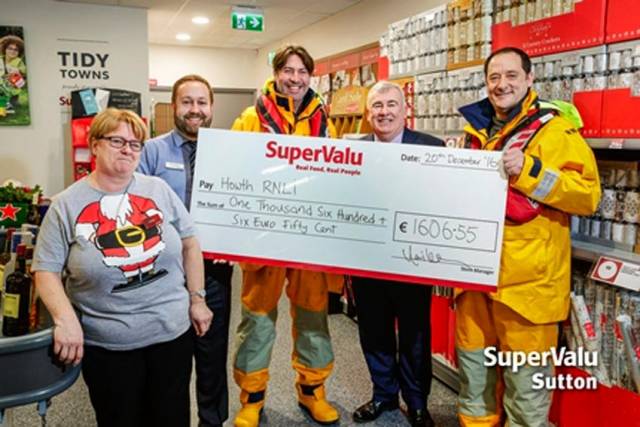#RNLI - Aidan Cooney, a presenter on TV3’s Ireland AM, took part in a ‘trolley dash’ around SuperValu Sutton this past Tuesday (20 Dec 2016) in an effort to raise much-needed funds for Howth RNLI.
As a result, SuperValu Sutton donated a cheque for over €1,600 to the local lifeboat station.
“I’ve nothing but admiration for the staff and volunteers of the RNLI,” said Cooney. “The lads at Howth and every other station provide a 24-hour search and rescue service 365 days a year.
“It was a no-brainer to donate the Trolley Dash to the lads and it was great fun chasing up and down the aisles of SuperValu Sutton.
“Big thanks to Neville and his staff who kindly exchanged the groceries for a hard cash donation to what is a vital service manned by volunteers.”
Rose Michael, Howth RNLI fundraising chair, thanked Cooney for taking time out of his busy schedule, and expressed “admiration for his speed around the aisles”.
Michael added: “We have been so lucky to have such incredible support from SuperValu Sutton as their Charity of the Year 2016. They have been unstinting in their efforts to raise funds for Howth RNLI and I’d like to thank them for today’s generous donation.”
Just a few days previously, Howth RNLI received a cheque for €5,525 from the Lough Lene Angling Association, raised as a result of the club’s annual charity fly-fishing competition organised by the Midlands Angling Club.
“Every year we hold a fly-fishing competition and raise money for charity,” said Tommy Fagan, chair of the Lough Lene Angling Association. “We’ve raised over €30,000 over the last eight or nine years.
“The Howth RNLI Community Safety Team carried out a life jacket clinic with us earlier this year, so it was decided that Howth RNLI would be the competition’s Charity of the Year 2016.”
Howth RNLI’s community safety officer said the money raised “will help to fund our Respect the Water safety campaign, and the running of lifejacket clinics with angling and water sports clubs.
“It will also go towards the cost of training and kitting out Howth RNLI’s volunteer lifeboat crew so they are ready to save lives at sea when their pagers sound.”































































